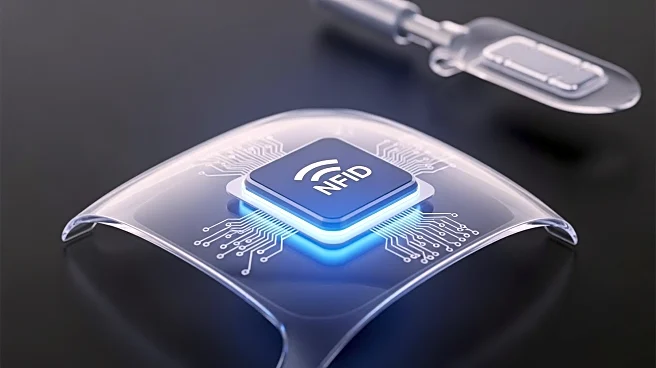What's Happening?
Recent advancements in NFC/RFID technology have led to significant developments in biomedical applications, particularly in wearable and implantable devices. These systems integrate sensing and wireless
power transfer through electromagnetic coupling, forming a distributed RLC resonant network. The technology allows for environment-responsive components to modulate circuit parameters, enabling the capture of sensor data. In wireless power transfer mode, optimized power transfer is achieved through mutual coupling, converting induced AC power into regulated DC output. The focus is on miniaturization, transmission efficiency, flexibility, biocompatibility, and biodegradability, which are essential for user comfort and biosafety. Challenges remain in achieving a balance between antenna miniaturization and transmission efficiency, as well as maintaining high efficiency in realistic scenarios.
Why It's Important?
The development of NFC/RFID-enabled wearables and implants is crucial for advancing healthcare technology, offering potential improvements in patient monitoring and treatment. These devices can provide continuous data collection and power supply without the need for batteries, enhancing the functionality and convenience of medical devices. The emphasis on biocompatibility and biodegradability addresses safety concerns, reducing the need for invasive procedures to remove devices. This technology could revolutionize patient care by enabling more personalized and efficient healthcare solutions, potentially reducing costs and improving outcomes.
What's Next?
Future research and development will likely focus on overcoming current limitations in NFC/RFID technology, such as improving transmission efficiency and achieving complete flexibility in device design. Innovations in materials and antenna design could lead to more effective and comfortable wearable and implantable devices. As the technology advances, regulatory bodies may need to establish new standards to ensure safety and efficacy. Collaboration between tech companies and healthcare providers will be essential to integrate these devices into mainstream medical practice.
Beyond the Headlines
The ethical implications of NFC/RFID technology in healthcare include concerns about privacy and data security, as these devices collect sensitive health information. There is also the potential for long-term shifts in healthcare delivery, with increased reliance on technology for patient monitoring and treatment. The cultural acceptance of wearable and implantable devices may vary, influencing their adoption and integration into healthcare systems.











